
Sometimes I wonder if we shall ever grow up in our politics and
Sometimes I wonder if we shall ever grow up in our politics and say definite things which mean something, or whether we shall always go on using generalities to which everyone can subscribe, and which mean very little.






The words of Eleanor Roosevelt strike with the strength of a mother’s chastisement and the vision of a prophetess: “Sometimes I wonder if we shall ever grow up in our politics and say definite things which mean something, or whether we shall always go on using generalities to which everyone can subscribe, and which mean very little.” Here she exposes the emptiness of hollow speech, the comfort of vagueness that lulls a people into complacency while leaving truth unspoken and justice undone. To grow up in politics is to cast away such shadows and speak with clarity, even when clarity wounds.
Roosevelt herself lived in an age when the temptation of generalities was great. Leaders often spoke of “freedom,” “prosperity,” or “unity,” but such words, without substance, were but banners fluttering in the wind. She, by contrast, demanded words that carried weight—policies that touched lives, laws that defended the weak, declarations that carried consequence. Her work with the Universal Declaration of Human Rights was not vague poetry, but a binding creed: a list of rights and freedoms that governments could be measured against. This was the definiteness she longed for—words forged into tools of accountability.
History reveals the danger of empty rhetoric. In the twilight of the Roman Republic, politicians filled the forum with noble slogans—“for the people,” “for liberty”—but their actions were chains of ambition, serving themselves rather than the state. The gulf between word and deed widened until the Republic collapsed into empire. So too, Roosevelt warns, nations that content themselves with soothing generalities without daring to commit to hard truths will one day find their foundations crumbled by the weight of falsehood.
Yet, there is also hope in her words. To grow up in politics is not impossible; it is the next step in civilization’s maturity. Just as a child must learn that honesty is better than flattery, so too must nations learn that true leadership speaks plainly, even at the cost of popularity. Great leaders—like Abraham Lincoln, who declared slavery a moral wrong, or Franklin Roosevelt, who named the Four Freedoms in the midst of war—dared to speak definite things. Such words endure because they were not designed to please all, but to stand firm in truth.
O children of the future, let this be your guide: do not be seduced by generalities that soothe but do not guide. Demand speech that has substance, words that bind those who utter them. For a politics of vagueness is a politics of immaturity, but a politics of clarity is the path to justice. Only when leaders dare to speak with courage will nations truly grow up, and only then will their words become stones laid upon the road of progress.






TNTrangg Nguyenn
Roosevelt’s quote makes me reflect on the way political discourse often feels like an exercise in consensus-building rather than actual problem-solving. The use of broad statements that don’t challenge anyone is comforting but unproductive. What would it take for politics to grow up and embrace honesty, specificity, and the willingness to make hard choices that don’t please everyone?
VLVõ Linh
Eleanor Roosevelt touches on a frustrating aspect of modern politics—generalities that are widely accepted but don’t lead to real change. I wonder if politicians avoid specifics because they fear alienating certain groups, or if they simply don’t know the answers. Is it possible for politics to mature in a way that prioritizes clarity and specificity over consensus and comfort?
TVTGM Vann
Roosevelt’s words challenge the political landscape where vague promises and general statements are the norm. She seems to question whether we are truly evolving in how we talk about politics. Are we ready for specific, concrete solutions, or will we remain trapped in the comfort of generalities that fail to address the real issues? How much longer can we avoid the hard conversations?
HHhai hau
This quote resonates with me because it critiques the political culture of using generalities that everyone can agree with, yet don’t actually solve problems. How often do we hear politicians speak in ways that are safe but hollow? Is it a sign of maturity in politics to take a stand and make bold statements, or is it too risky in today’s polarized environment?
LLNguyen Hoang Ly Ly
Eleanor Roosevelt’s quote seems to highlight the tendency in politics to use vague language that sounds agreeable but lacks substance. It makes me wonder if this is a strategic choice to avoid alienating people, or if it’s a failure to confront hard truths. Can we really progress in politics without the courage to speak clearly and specifically, even if it means risking disagreement?